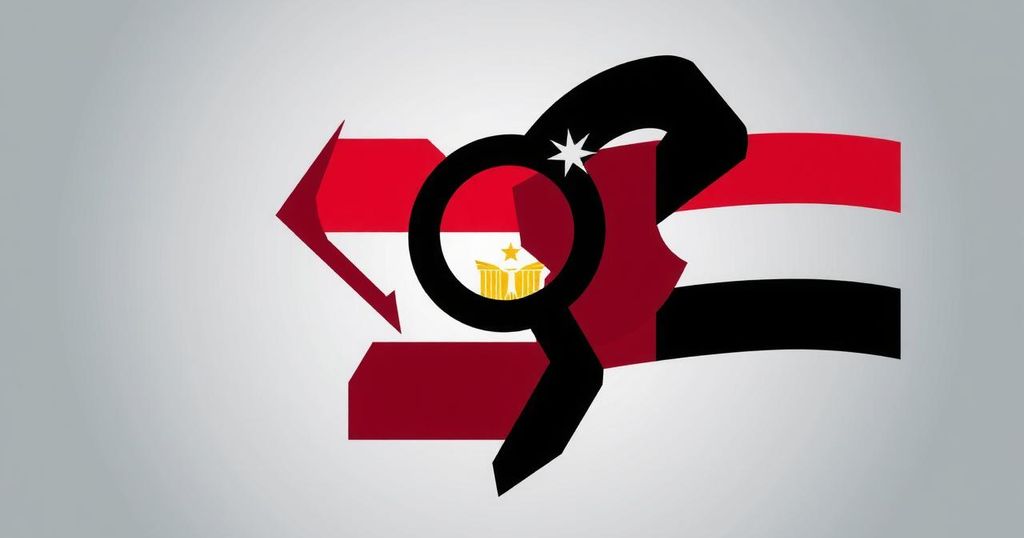A hidden battle between Egypt and the UAE over Sudan’s future is intensifying during the ongoing civil war. The two nations support opposing forces: Egypt backs the SAF, while the UAE supports the RSF, each with differing views on stability and resource extraction. The humanitarian crisis deepens as both countries pursue their strategic interests, necessitating urgent diplomatic intervention to stabilize the region.
In the context of Sudan’s ongoing civil war, a significant power struggle is emerging between two regional powers: Egypt and the United Arab Emirates (UAE). Egypt is aligning with the Sudanese Armed Forces (SAF), while the UAE supports the Rapid Support Forces (RSF). This conflict, which escalated on April 15, 2023, has led to a dire humanitarian situation in Sudan, threatening its statehood.
The Biden administration has imposed sanctions on key figures from both factions. RSF commander Hemedti faces sanctions for his involvement in genocide, while SAF’s General Abdel Fattah al-Burhan is punished for obstructing peace and humanitarian aid. Despite extensive evidence of the UAE’s backing of the RSF, Abu Dhabi maintains that it plays a neutral, humanitarian role in Sudan.
Egypt has increasingly expressed its support for the SAF, emphasizing the need to recognize the Sudanese army’s role in restoring stability. During a press briefing with U.S. officials, Egyptian Foreign Minister Badr Abdelatty insisted on distinguishing the Sudanese military from other actors. He acknowledged Egypt’s intention to bolster the SAF’s capacities alongside partners in the Horn of Africa.
Despite shared interests in various regional issues, the relationship between Egypt and the UAE is complicated by their opposing positions in Sudan’s conflict. President Abdel Fattah el-Sisi’s regime has depended on Gulf financial support, notably from the UAE, which invested heavily in Egyptian infrastructure projects. However, these economic ties have not bridged their differences regarding Sudan.
Egypt views the SAF as essential for maintaining security along its borders, particularly regarding the influx of Sudanese refugees, which has surged since the outbreak of hostilities. A total collapse of Sudan could exacerbate this crisis and jeopardize Egypt’s own stability. As the conflict progresses, the potential for a larger refugee crisis looms ever larger.
Additionally, the security of Egypt’s Nile waters is threatened by the instability in Sudan, further complicating its dealings with Ethiopia over the Grand Ethiopian Renaissance Dam (GERD). Sudan has historically supported Egypt in these negotiations, but the ongoing conflict has undermined Egypt’s leverage.
Recently, Ethiopia and other upstream nations have capitalized on Sudan’s turmoil by advancing the Cooperative Framework Agreement, which disrupts traditional treaties favoring Egypt and Sudan. In response, Egypt has sought to create a security alliance with Eritrea and Somalia, hoping to leverage this partnership to stabilize Sudan.
The UAE’s engagement with the RSF has faced setbacks as the group struggled to assert control amid the war. The UAE’s initial strategy focused on exploiting Sudan’s resources, particularly its gold trade. However, the conflict has led Sudan to cancel significant agreements, limiting the UAE’s influence and access in the region.
The divergent approaches of Egypt and the UAE in Sudan highlight their contrasting views on stability and resource control. Egypt envisions a central role for the SAF, while the UAE perceives the RSF as a tool for economic gain. Recent talks indicate the potential for negotiations, with Sudan’s government seeking the cessation of UAE support for the RSF in exchange for cooperation.
This situation presents a critical juncture for the UAE, which must grapple with the implications of its actions and the need for substantial reparations while also addressing its global humanitarian image. Meanwhile, Egypt’s mediating role could be crucial in resolving the crisis and fostering a ceasefire.
The path to stabilization will depend on the willingness of both Egypt and the UAE to find common ground. The United States could play a pivotal role in facilitating dialogue between the two nations, which would be essential in preventing further deterioration of the conflict and its humanitarian consequences in Sudan.
The power dynamics in Sudan are shaped by the ongoing civil war, which has seen different regional actors such as Egypt and the UAE positioning themselves in support of rival factions. Egypt has a vested interest in Sudan’s stability due to security concerns along its borders and the protection of its water supply from the Nile. Conversely, the UAE’s involvement is driven by strategic economic interests, particularly regarding Sudan’s natural resources and its geopolitical ambitions in the region. As factions vie for control, the humanitarian crisis in Sudan exacerbates, necessitating urgent diplomatic intervention to mitigate the fallout.
The unfolding power struggle in Sudan between Egypt and the UAE underscores the complexity of regional geopolitics amid a humanitarian crisis. Egypt seeks to stabilize the SAF as the backbone of Sudanese governance, while the UAE’s interests may hinder prospects for peace. Enhanced dialogue and cooperation are imperative, necessitating diplomatic efforts led by influential nations like the United States to foster constructive engagement and avert further escalation of the conflict.
Original Source: responsiblestatecraft.org






